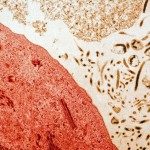Lien vers Pubmed [PMID] – 25253342
J. Virol. 2014 Dec;88(23):13811-20
UNLABELLED: Lassa virus is an Old World Arenavirus which causes Lassa hemorrhagic fever in humans, mostly in West Africa. Lassa fever is an important public health problem, and a safe and effective vaccine is urgently needed. The infection causes immunosuppression, probably due to the absence of activation of antigen-presenting cells (dendritic cells and macrophages), low type I interferon (IFN) production, and deficient NK cell function. However, a recombinant Lassa virus carrying D389A and G392A substitutions in the nucleoprotein that abolish the exonuclease activity and IFN activation loses its inhibitory activity and induces strong type I IFN production by dendritic cells and macrophages. We show here that during infection by this mutant Lassa virus, antigen-presenting cells trigger efficient human NK cell responses in vitro, including production of IFN-γ and cytotoxicity. NK cell activation involves close contact with both antigen-presenting cells and soluble factors. We report that infected dendritic cells and macrophages express the NKG2D ligands major histocompatibility complex (MHC) class I-related chains A and B and that they may produce interleukin-12 (IL-12), IL-15, and IL-18, all involved in NK cell functions. NK cell degranulation is significantly increased in cocultures, suggesting that NK cells seem to kill infected dendritic cells and macrophages. This work confirms the inhibitory function of Lassa virus nucleoprotein. Importantly, we demonstrate for the first time that Lassa virus nucleoprotein is involved in the inhibition of antigen-presenting cell-mediated NK cell responses.
IMPORTANCE: The pathogenesis and immune responses induced by Lassa virus are poorly known. Recently, an exonuclease domain contained in the viral nucleoprotein has been shown to be able to inhibit the type I IFN response by avoiding the recognition of viral RNA by cell sensors. Here, we studied the responses of NK cells to dendritic cells and macrophages infected with a recombinant Lassa virus in which the exonuclease functions have been abolished and demonstrated that NK cells are strongly activated and presented effective functions. These results show that the strategy developed by Lassa virus to evade innate immunity is also effective on NK cells, explaining the weak NK cell activation observed with the wild-type virus. By providing a better understanding of the interactions between Lassa virus and the host immune system, these results are important for the field of arenavirus biology and may be useful for a vaccine approach against Lassa fever.


